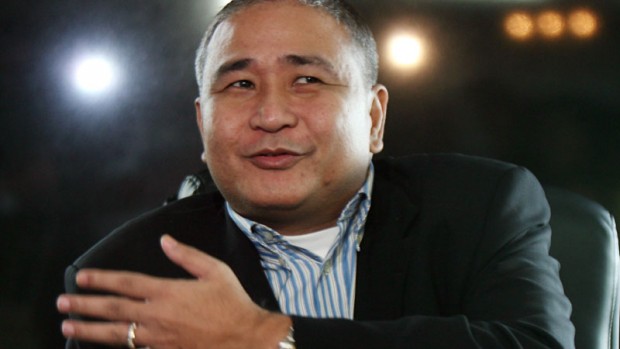Pagcor: Hard to launder money in casinos
PROBERS may be barking up the wrong tree as they follow the trail of $100 million in illicit funds that recently entered and left the Philippines, according to state-run Philippine Amusement and Gaming Corp. (Pagcor).
The notion that a casino is the easiest place to launder money is wrong because no one wins more than the house, Pagcor chair and CEO Cristino “Bong” Naguiat told the Inquirer.
“Although possible, it’s the riskiest place to launder dirty money and investigators should look elsewhere,” Naguiat said on Friday.
He issued the statement after a senator claimed that a casino was the easiest place to launder money in the Philippines, as the money could be easily claimed as gambling winnings.
Sen. Sergio Osmeña III, chair of the Senate committee on banks and financial institutions, said last week that the exclusion of casinos from coverage of the Anti-Money Laundering Act was one of the law’s biggest loopholes.
Article continues after this advertisementReports said the $100 million entered the local financial system through the Makati branch of Rizal Commercial Banking Corp. (RCBC).
Article continues after this advertisementThe funds were reportedly converted into pesos with the help of a foreign exchange and remittance firm called Philrem, and later consolidated from five bank accounts into a single corporate account of a businessman running an operation that brings in high rollers from abroad.
The money was reportedly spirited out of the country through high rollers brought in by junket operators.
Senate inquiry
The Senate’s inquiry into the alleged $100-million money laundering through casinos has been postponed for another week because some of the bank officials invited to the hearing would be unavailable on the original date, Osmeña said Sunday.
In a radio interview, Osmeña said the hearing had been reset to March 14 from March 8.
The National Bureau of Investigation, for its part, has started its probe of the money laundering, touted to be the biggest single transaction involving dirty money in the country.
Pagcor probe
Naguiat told the Inquirer that Pagcor itself had started its own investigation of the report that up to $100 million was remitted to the bank accounts of three casinos.
“We expect the casinos to submit their comments on the allegation as an initial step in the investigation within this week,” he said in a telephone interview.
Pagcor, which operates 13 casinos across the country, has awarded provisional licenses to private operators, like Resorts World Manila and four casino resorts in Entertainment City. Of the four, Solaire Resorts Manila and the City of Dreams have started operations. Private operators pay license fees to Pagcor.
Naguiat said that as a matter of regulation, Pagcor required casinos to employ strict internal control policies on fund movements and issuance of playing chips.
Chips are used in the games instead of cash because players tend to gamble more with chips. By contrast, cash players tend to become cautious, according to casino enthusiasts.
“There are two kinds of chips—the noncash negotiable and the cash negotiable,” Naguiat said.
The nonnegotiable chips refer to money remitted through the bank accounts of casinos for a specific player.
“Any amount that lands in casino bank accounts is presumed good money because it had gone through the banking system before it was remitted to us,” Naguiat said.
“There is no way for us to know if the money came from illegal sources. It’s the bank’s job,” he added.
No receipt for winnings
Casinos, he said, do not issue receipts or certificates for winnings.
“No one can claim to a bank that the money being deposited is from casino bonanza because there’s no receipt or certificate to show for it. However, all of the winnings are properly recorded and can easily be accessed by any government agency,” said the Pagcor chair.
He added that the money remitted to a high roller’s credit account in a casino could not be taken out of the casino in cash should the player decide to stop playing.
“Only the winnings could be converted into cash. If you want to launder money through casinos, the risk is so high. The possibility that you will lose all the money is very high,” Naguiat said.
He said that in the case of cash transactions, the money-laundering scheme was also “highly unlikely.”
“The cash a player brings into the casino is set aside and is given back to him in the event he wins or decides to stop playing. We just give back what he brought in,” Naguiat said.
In addition to protocols aimed at preventing illegal transactions, casinos are advised to implement the “know your customer [policy], particularly with regard to high-value patrons.”
Internal controls
Naguiat said records of financial transactions were available for scrutiny on demand. “The internal control systems and procedures generally follow casino industry standards practiced in many gaming jurisdictions throughout the world,” he said.
He added that none of the casinos mentioned in the news reports had accounts with the bank through which the funds in question had first entered the local financial system.
“It is worth noting that all bank remittances into a casino’s bank account regardless of amount are subjected to scrutiny as to the identity of the remitting party and the purpose of the remittance,” he said.
While Pagcor is doing its own inquiry, “it believes that the Anti-Money Laundering Council (AMLC) is in a better position to deal with the issue as the casino industry relies on the AMLC safeguards within the Philippine banking system,” Naguiat said. With reports from Leila B. Salaverria and Inquirer Research
